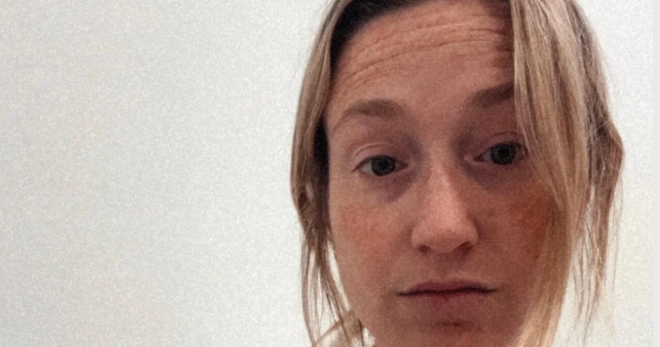
Woman diagnosed with breast cancer at 27 after almost ignoring warning sign: “Hard to believe”
Marissa Coreno was embracing a new life in 2021. She had just moved out of her parents’ house and was spending more time in the gym. She liked her job at a hospital in Ohio. Everything seemed to be going great — until she found a lump in her armpit.
Coreno wasn’t particularly concerned at first. She was 27 and had no family history of cancer. But her colleagues thought she shouldn’t ignore it. An ultrasound found “questionable characteristics.” That was followed by a mammogram, then a biopsy.
Three days later, Coreno was diagnosed with Stage II breast cancer that had spread to her lymph nodes. She said she felt like her world had been turned upside down.
“It was devastating. It took a while to process. I knew it was positive, and I knew I had breast cancer but in my head, it was like ‘No way,'” Coreno said. “You hear about these cases and you see them on TV but it was hard to believe that this was now my life.”
Marissa Coreno
An increase in young diagnoses
Breast cancer is the leading cause of cancer death in U.S. women aged 20 to 49, and the incidence rate of breast cancer in women under 50 has risen faster than in women over 50, according to the Breast Cancer Research Foundation.
“I’ve been a physician for over 25 years. When I first started practicing, we saw women in their 40s and now we’re seeing the late 20s and early 30s more commonly,” said Dr. Mary Gemignani, the director of the Women’s Early Onset Cancer Program and chief of the Division of Breast Surgery at NYU Langone, who was not involved in Coreno’s care.
Still, breast cancer diagnoses in women as young as Coreno are rare. The American Cancer Society estimates that only about 1 in 1,344 women will develop breast cancer in their 20s. Younger patients are unlikely to have regular screenings, Gemignani said, since most women do not receive mammograms until they are 40. Younger women also tend to have “more aggressive” tumors or be diagnosed with rarer disease subtypes, Gemignani said. There is no proven reason for the increase, she said.
Gemignani said younger women tend to have unique needs, including fertility concerns, which make it important for them and their doctors to develop a personalized treatment plan. Coreno said she found few research studies that looked at outcomes for her age group but spoke candidly with Dr. Baidehi Maiti, a medical oncologist at the Cleveland Clinic, about her best options.
“Being so young and not having a lot of research or studies or proof out there, every option I had along the way, I chose the most,” Coreno said. “I was very protective.”
Connection amid “exhausting” chemotherapy
Coreno’s treatment started with four months of “exhausting” chemotherapy to stop her cancer from spreading any further. Her mom moved in to help take care of her, while her dad drove her to every appointment. Coreno said she lost her hair and could barely leave the house.
“Going from such an active life — I was in my prime, I was working out on the regular, I was so proud of what I had accomplished — to not even having enough energy to get off the couch was hard,” Coreno said.
Marissa Coreno
There was one bright spot: One night, Coreno decided to “eat (her) feelings” and ordered Crumbl cookies. She posted a picture of the delivery on Instagram. She received a message about the sweet treat from Anthony, a former classmate. The two struck up a conversation and “just never stopped talking.”
“It was so nice to talk to somebody, have somebody listen to me, have a new friend that I could confide in,” Coreno said.
Eventually, the two went on a date. Coreno dreaded leaving the house and was self-conscious about wearing a wig but enjoyed herself.
“He didn’t even mention the wig. We just had a great time,” Coreno said. “It just felt so natural.”
Marissa Coreno
After chemotherapy, Coreno underwent a double mastectomy, followed by a reconstruction surgery and 25 days of radiation therapy, Maiti said. Coreno started hormone therapy in March 2022 and will continue it until 2032. She also has regular scans. The treatment stops her body from creating estrogen to limit the chance of the cancer returning. Coreno is currently cancer-free, Maiti said.
“She has not let cancer define her life,” Maiti said. “She’s thriving as a breast cancer survivor and living her life to the fullest.”
“Life is beautiful”
The hormone therapy sent Coreno into menopause at 28. Working out is harder now, she said, and she grapples with hot flashes and has trouble sleeping. It has taken years for her to get used to the new normal.
“I thought this would be the easy part,” Coreno, now 31, said. “After treatment was over is when what I went through hit me the most.”
Amid the difficult adjustment, her relationship with Anthony turned more serious. They were married in August 2024 and spent their honeymoon in Italy. Over the summer, they celebrated their anniversary in Cancún, Mexico.
Arlee Reust/Azkalynn Photography
Coreno also hopes that sharing her story encourages others to investigate any warning signs they experience.
“I just want everyone to realize that it seems like it will never be you, it seems like it’s always going to be someone else, it seems like it’s going to be a person on the TV, but it can happen to you,” Coreno said. “If you feel uncertain about anything, you need to speak up and get checked out. If, for some reason, you don’t get the best news, there is light at the end of the tunnel. It might not seem like it. It might seem like it’s a very long tunnel. But life is beautiful afterwards.”
First Appeared on
Source link









